Welcome
....to JusticeGhana Group

JusticeGhana is a Non-Governmental [and-not-for- profit] Organization (NGO) with a strong belief in Justice, Security and Progress....” More Details
Burkina protesters burn parliament, ransack state TV
- Details
- Category: DateLines
- Created on Thursday, 30 October 2014 00:00
- Hits: 4156
 Burkina protesters burn parliament, ransack state TV
Burkina protesters burn parliament, ransack state TV
By Mathieu Bonkoungou and Joe Penney, OUAGADOUGOU (Reuters) - Thousands of protesters stormed Burkina Faso's parliament and ransacked state television on Thursday, forcing it off the air ahead of a planned vote on a motion to allow the veteran president to extend his 27-year rule.
Black smoke swirled in the air around parliament after demonstrators lit fires inside the building before looting computers and televisions screens and wheeling away police motobikes, a Reuters reporter said.
The crowd headed towards the presidency as a government helicopter flew overhead, shooting teargas at protesters.
Lawmakers had been due to vote on Thursday on a government plan to change the constitution to allow President Blaise Compaore - who took power in a coup in 1987 - to stand for re-election again next year, when he was due to stand down.
According to one local reporter, state television read a statement saying the proposal had been withdrawn before it was forced off air. However, the information minister, reached by telephone, said he could not confirm this.
"We did this because Blaise was trying to stay too long. We are tired of him," said Seydou Kabre, a protester in the crowd heading for the prime minister's office. "We want a change. He must go!"
Most deputies had not yet arrived for the vote when protesters, who had set up barricades outside parliament from early on Thursday, stormed the building. The crowd surged forward after police fired warning shots in the air.
A Reuters reporter saw nearby structures also on fire and vehicles outside the parliament being smashed.
DEEPLY DIVIDED
Compaore's attempt to remain in power has deeply divided Burkina Faso, one of the world's poorest nations but a key player in West Africa that had positioned itself as a mediator in regional crises.
It has also drawn criticism from former colonial power France and from the United States, allies of the Burkinabe government in operations against al Qaeda-linked groups in West Africa.
Compaore has ruled the cotton and gold-producing nation with a firm grip but, in recent years, he has faced increasing criticism, including from within his own camp and the military.
"If needs be we are going to march to the presidency. We want Blaise Compaore to leave, We want change," said George Sawadogo, a 23-year-old student.
Opposition to Compaore's plan have been mounting in recent days.
Hundreds of thousands of people took to the streets of Ouagadougou and other towns across the country on Tuesday in what the opposition said was the start of a campaign of civil disobedience over the proposed constitutional reform. The government has called for restraint.
"This seems to have moved us to a situation where Compaore will have to leave power before the end of his term next year," said Gilles Yabi, an independent West Africa analyst. "It will depend on how the security forces react, but I can't imagine that Blaise will be able to finish his term if there is serious violence today."
France has called on Compaore to adhere to African Union rules preventing constitutional changes that allow leaders to stay in power. The U.S. government has said it is concerned.
"All bets are off now," said one Western diplomat in Ouagadougou, who asked not to be identified.
(Additional reporting by David Lewis and Bate Felix in Dakar; Writing by Daniel Flynn, editing by John Stonestreet)
Source: Reuters
Searching for Germany's identity on a bike
- Details
- Category: The World
- Created on Sunday, 26 October 2014 00:00
- Hits: 4786
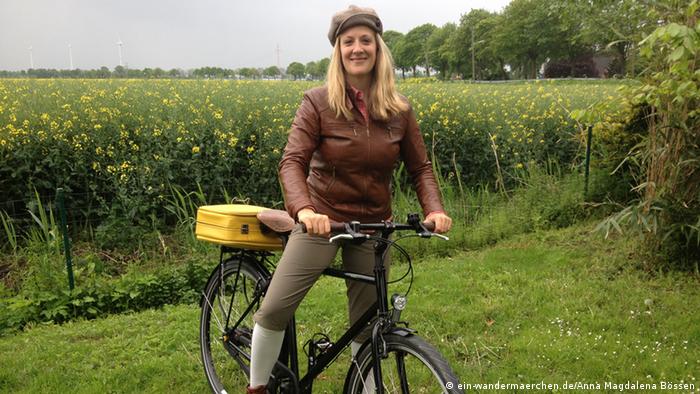 Searching for Germany's identity on a bike
Searching for Germany's identity on a bike
What makes Germans tick? That's what Anna Magdalena Bössen wants to find out. She is biking through Germany to get to know the country better. Along the way, she recites German poetry in exchange for a place to stay.
DW: Miss Bössen, you just returned home from a special journey. For the last three months, you biked through half of Germany to get to know the country and its people better. Along the way you recited German poems and literary texts for board and lodging. How exactly can I picture this mixture of a bike tour, reciting literature and couchsurfing?
Anna Magdalena Bössen: I am basically out on the road with a yellow suitcase full of German poems. But the great German poets and thinkers are only symbolically in my suitcase. I am a reciter by profession, so I know all of these texts by heart.
I have a website with an interactive map on which hosts can sign up and offer anything like a bed, a stage or even just a meal in exchange for my literary show, which is basically a currency, given that I offer something in exchange for people hosting me.
What exactly does your literary show entail?
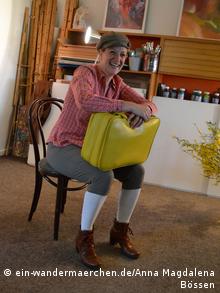 On the one hand, my literary show consists of a cross-section through German literature - from classics like Goethe and Schiller to literature written by Germans living in exile during the Holocaust. On the other hand it contains specific quotes by German poets and thinkers who reflected upon what it means to be German. So I recite these German quotes and poems - but not just at the breakfast table. I have an entire stage show. Usually the people hosting me organize some sort of an event, they invite guests, rent a room, maybe even prepare some food.
On the one hand, my literary show consists of a cross-section through German literature - from classics like Goethe and Schiller to literature written by Germans living in exile during the Holocaust. On the other hand it contains specific quotes by German poets and thinkers who reflected upon what it means to be German. So I recite these German quotes and poems - but not just at the breakfast table. I have an entire stage show. Usually the people hosting me organize some sort of an event, they invite guests, rent a room, maybe even prepare some food.
I'd say on average I perform in front of 20 to 50 people. And the program needs a crowd, it's very interactive. It's more than just a reading; it's almost like a play or a cabaret. For instance, I regularly ask: "Would you say you represent Germany?" And then we discuss what it means to be German based on personal stories and the literary texts I recite.
How exactly do you discuss the question of what makes Germans tick?
My program opens with Heinrich Heine's poem "Germany. A Winter's Tale." The title of my literary bike tour "Germany. A Wanderer's Tale" is a direct reference to Heine's work. The poem is about building a kingdom of heaven on Earth. So I usually open with the question whether it is possible to do that. Most people in the audience say that we already live quite heavenly in Germany but that we don't treat our country like heaven. They all say we have it pretty well here in Germany, especially compared to other countries.
One thing most people agree on is that Germans complain too much. So when I ask: "Who here thinks Germans complain too much?" then everyone lifts their hands. But when I ask: "And who of you complains too much?" then no one raises their hands anymore, except for a few honest ones.
Melancholy plays an important role in German literature as well as your literary bike tour. Do you think Germans are especially melancholic?
 Germans definitely don't take things very easy. We're not very light-minded and carefree. One woman in the audience once said that what I do is already something very German. I don't just bike through Germany and see where I'll end up staying, I have an overall topic for this trip, I raise philosophical questions on my journey that I try to find answers to. That's of course very German of me, this constant reflection and not taking things lightly. But I think that's also a good characteristic, even though it sometimes holds us back.
Germans definitely don't take things very easy. We're not very light-minded and carefree. One woman in the audience once said that what I do is already something very German. I don't just bike through Germany and see where I'll end up staying, I have an overall topic for this trip, I raise philosophical questions on my journey that I try to find answers to. That's of course very German of me, this constant reflection and not taking things lightly. But I think that's also a good characteristic, even though it sometimes holds us back.
Is there anything you learned about Germans on your trip that you weren't aware of before?
I confirmed something that I was already suspecting and hoping for: There is still a very strong love of literature. We used to be the country of great poets and thinkers but our history and the holocaust eroded that for a while.
Nowadays poetry in school is mainly analyzed and doesn't get experienced anymore. But in order to really feel poetry you have to move away from the analytical side of it. When I recite the poems in a different context, then the audience really gets into the literature and it has a completely different effect. I always suspected that Germans are still excited about literature but I didn't expect that I can really touch so many people with poetry. That makes me very happy.
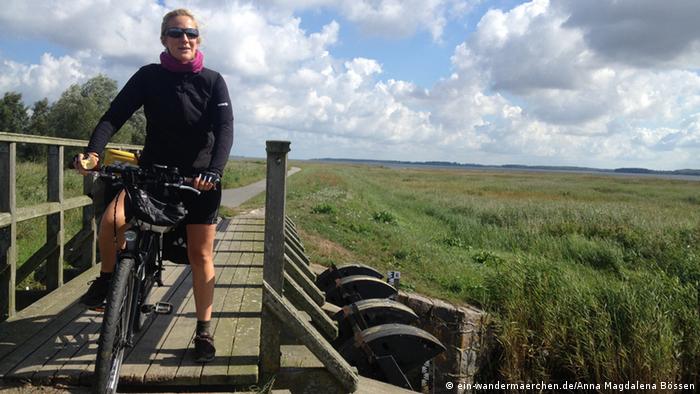
Why did you decide to tour Germany on a bike? You could've hitchhiked or taken public transportation.
I'm a total bike person. By mastering the landscape I make it mine. It's a completely different feeling to reach a city on a bike, to pass the very first city sign. I will never forget that the city of Jena lies between beautiful hillsides - because I had to climb them all. And then there is the speed, which is just perfect on a bike. You proceed quickly enough but you still experience everything - from the weather to animals and people.
Anna Magdalena Bössen is a 34-year-old speech trainer and founder of the Hamburg city tours "textouren." She started her literary bike tour "Germany. A Wanderer's Tale" in May 2014 and will finish the second half of her tour in October 2015.
Date 22.10.2014
Author Anne-Sophie Brändlin
Source: Deutsche Welle
Pistorius sentenced to five years for manslaughter
- Details
- Category: Law & Justice
- Created on Tuesday, 21 October 2014 00:00
- Hits: 3560
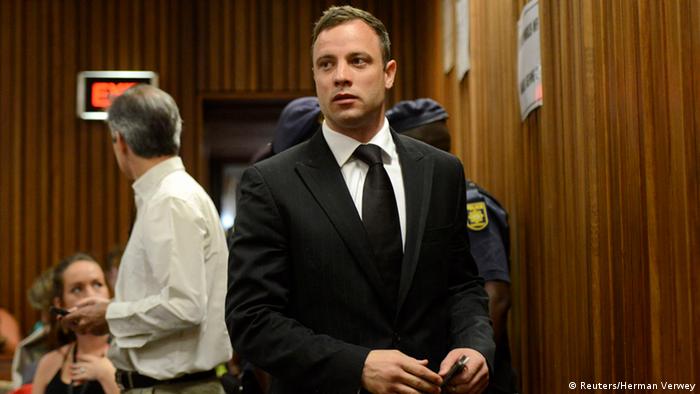 Pistorius sentenced to five years for manslaughter
Pistorius sentenced to five years for manslaughter
Oscar Pistorius has been sentenced in a South African courtroom. He is to serve five years in prison following a manslaughter conviction.
Pistorius was convicted in September of South Africa's equivalent of manslaughter following the shooting death of Reeva Steenkamp, his girlfriend. The prosecution had asked for a sentence of at least 10 years.
Defense lawyers of Pistorius argued a jail term would "break" him, and said imprisonment would be harmful to his current emotional state. They called for three years of house arrest with community service.
The judge in the case, Thokozile Masipa, said a non-custodial case was not appropriate. Responding to the defense's claims that due to Pistorius's disability – he had his lower legs amputated as a child – he would be particularly vulnerable in prison, Masipa said, "yes, the accused is vulnerable, but he also has excellent coping skills."
"It would be a sad day for this country if an impression were to be created that there was one law for the poor and disadvantaged and another for the rich and famous," she added.
Pistorius was also convicted of a separate firearms charge and was given a three-year suspended sentence.
The South African double-amputee Paralympian champion, who also competed in races at the 2012 Olympics, went on trial on March 3, 2014.
On February 14, 2013, he fired four hollow-point bullets through a locked toilet door in his Pretoria home, killing his girlfriend of three months.
Pistorius claimed in testimony that he believed he had been shooting at an intruder.
A lawyer for Steenkamp's family said they felt the judge had delivered "the right sentence."
mz/ipj (AFP, Reuters)
Source: Deutsche Welle
Interior Ministry Pushes For Non-custodial Sentence
- Details
- Category: Law & Justice
- Created on Sunday, 26 October 2014 00:00
- Hits: 4192
 Interior Ministry Pushes For Non-custodial Sentence
Interior Ministry Pushes For Non-custodial Sentence
The Ministry of the Interior is pushing for the adoption of non-custodial sentencing measures into the criminal jurisprudence to help decongest the country’s prisons.
In line with that, stakeholders in the criminal justice system will attend a two-day brainstorming session on October 29 and 30, 2014, to be organised by the ministry in collaboration with the Judicial Service, the Ministry of Justice and Attorney-General and the Ghana Prisons Service.
The Sector Minister, Mr Mark Woyongo, who announced this at a media launch of the forum in Accra, outlined areas to be considered to include decongesting the prisons, making prison conditions better and of international standards, bringing the conditions of prisons in line with modern trends and best practices.
Other areas to consider, he said, would be how to expand sentencing options available to judges, reducing government expenditure on prisons, enhancing the health conditions of prison inmates and improving upon their human rights.
Community service
“It hurts to see very young and able-bodied men and women languishing in our jails for offences like petty stealing, which could have earned them community service,” Mr Woyongo said.
He also wondered why the government should continue to spend so much of its inadequate resources on such persons when they could rather have been made to offer services for community development, indicating that such services would be highly useful in the area of sanitation.
He appealed to the media to collaborate with the ministry to propagate its decision to adopt non-custodial sentence.
Mr Woyongo recalled that during his recent tour of the country’s prisons he noticed overcrowding, which, he said, could result in a lot of health challenges.
He made reference to the report of the UN Special Rapporteur on prisons, who visited the country last year, as having painted a bad picture of prisons in the country and said there was the need to improve prison conditions.
Remand
On remand, the minister expressed concern that some persons had been on remand for five years and said he was pushing for the situation where such persons would be freed.
He said it was not fair for a person to be on a remand for such a long time, stressing that justice delayed was justice denied.
Mr Woyongo conceded that most prison structures in the country had been run down, describing some of them as death traps.
He announced that the United Kingdom had provided some financial assistance which was being used to upgrade the clinics in the prisons and other infrastructure.
On feeding, he said a prisoner was fed on GH¢1.80 a day and described it as woefully inadequate, explaining that the ministry was liaising with the Ministry of Finance for a possible upward adjustment of the feeding grant.
He was grateful that the Narcotics Control Board, the UNDP, UNCEF, the British High Commission and many other institutions were supporting the dialogue and subsequent processes to make the initiative a policy.
Source: Graphic.com.gh
.......
Dave Lee Travis sentence ‘not unduly lenient’
- Details
- Category: Law & Justice
- Created on Tuesday, 21 October 2014 00:00
- Hits: 3761
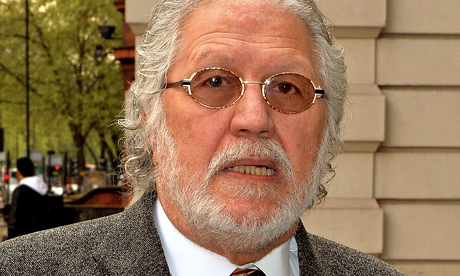 Dave Lee Travis sentence ‘not unduly lenient’
Dave Lee Travis sentence ‘not unduly lenient’
Attorney general rules that DJ’s sentence for indecently assaulting researcher will not be referred to court of appeal
Press Association
Disgraced DJ Dave Lee Travis’s three-month suspended sentence for indecent assault will not be referred to the court of appeal, the attorney general has said.
Jeremy Wright QC found that the 69-year-old’s sentence for indecently assaulting a TV researcher on the Mrs Merton Show in 1995 was “neither wrong in principle nor unduly lenient”.
Travis, whose real name is David Griffin, was found guilty at London’s Southwark crown court and sentenced by Judge Anthony Leonard last month.
A spokesman for the attorney general’s office said: “The attorney general, Jeremy Wright QC MP, has decided not to refer the suspended prison sentence given to David Griffin to the court of appeal as he does not believe they would find it to be unduly lenient and increase it.
“The judge marked the seriousness of the offence by imposing a three-month sentence of imprisonment, the maximum under the guidelines being six months.
“It was neither wrong in principle nor unduly lenient to suspend that sentence.”
The case was considered for referral to the court of appeal after four members of the public contacted the attorney general’s office to complain about the sentence.
Travis’s trial heard that the former Top of the Pops presenter who became a household name in the 1970s got a “weird sexual thrill” when he indecently assaulted the woman, who is now a successful TV personality, in 1995.
He cornered her in the corridor of a BBC television studio where she was smoking, and commented on her “poor little lungs” before squeezing her breasts for 10 to 15 seconds.
Travis was found not guilty on a second indecent assault charge and the jury was discharged after it was unable to agree a verdict on a count of sexual assault.
He faced a retrial after jurors failed to reach verdicts on those two charges earlier this year. He was cleared of 12 counts of indecent assault at his original trial in February.
Travis, of Aylesbury, Buckinghamshire, was first arrested in October 2012 under Operation Yewtree, Scotland Yard’s investigation into historical sexual abuse in the wake of allegations against the late DJ Jimmy Savile.
Source: The Guardian UK


